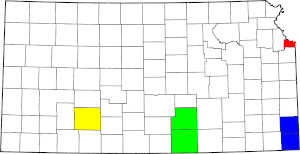The Legal History of Kansas Crossing: KELA & the Kansas Constitution
On May 5, the Kansas Supreme Court released its opinion in Board of County Commissioners of the County of Cherokee v. Kansas Racing & Gaming Commission (PDF). That case involved the political wrangling that led to the opening of Kansas Crossing Casino & Hotel on the outskirts of Pittsburg, Kansas earlier this year. Kansas Crossing opened a decade after the state first authorized the establishment of a casino in Southeast Kansas through the Kansas Expanded Lottery Act (KELA).
What took so long?
I'll answer that question in a series of posts over the next several weeks. In this post, I'll introduce KELA and discuss one of the several lawsuits filed along the path to Kansas Crossing's opening day.
The Kansas Constitution and Lotteries
Since Kansas became a state in 1861, article 15, section 3 of the state constitution has stated that "[l]otteries and the sale of lottery tickets are forever prohibited." That ban doesn't only cover what we today would call a lottery. Instead, the Kansas Supreme Court has interpreted section 3 to extend to many other forms of gambling, including slot machines and betting in horse races and dog races.
But over time, Kansas residents have amended the Kansas Constitution to loosen section 3's strict prohibition. Sections 3a and 3d of article 15 authorize bingo games and raffles by certain nonprofit organizations. Section 3b permits gambling on horse and dog racing. Finally, section 3c allows the Kansas Legislature to "provide for a state-owned and operated lottery."
Section 3c was added to the state constitution in 1986. In 1987, the Kansas Legislature enacted the Kansas Lottery Act, K.S.A. 74-8701 through 8732. Unsurprisingly, that Act created the Kansas Lottery, which soon began selling lottery tickets at gas stations and other businesses throughout the state.
KELA: The Kansas Expanded Lottery Act
In 2007, the Kansas Legislature enacted KELA, K.S.A. 74-8733 through 8773. KELA established four "gaming zones" in Kansas: the northeast zone in Wyandotte County; the southeast zone in Crawford and Cherokee Counties; the south central zone in Sedgwick and Sumner Counties; and the southwest zone in Ford County.

The Act authorized the Kansas Lottery to own a casino in each zone, although each was to be developed and managed by an Indian tribe or private management company. This structure raised questions about whether KELA complied with the state constitution's requirement that a lottery be "state-owned and operated." The Prairie Band Potawatomi Nation, which owned the largest casino in Kansas at the time, threatened to sue to block the law.
They were beaten to the punch by a surprising challenger: the State of Kansas.
State ex rel. Six v. Kansas Lottery
On August 23, 2007, Kansas Attorney General Paul Morrison filed a lawsuit on behalf of Kansas challenging the validity of KELA. Governor Kathleen Sebelius, who supported KELA and signed it into law, had asked him to do so, concerned that companies would be reluctant to apply to manage one of the four KELA casinos without a court ruling saying the Act was constitutional.
On February 1, 2008, the Shawnee County District Court released its decision in the case (PDF), upholding KELA. It pointed to several aspects of the Act that showed "ownership" and "operation" by the state, including:
- Several references in KELA to state ownership, such as the requirement that the state's contract with a management company "place full, complete, and ultimate ownership and operational control of the gaming operation . . . with the Kansas lottery;" and that "[t]he Kansas lottery shall be the licensee and owner of all software programs used . . . for any lottery facility game."
- The state's exclusive control over the manager-selection process.
- The state's control over possession and distribution of each casino's daily revenue.
- The ability to monitor each game present in the casinos, along with the power to shut off any machine remotely at any time.
The state (now represented by Attorney General Stephen Six) appealed to the Kansas Supreme Court, which issued its opinion (PDF) on June 27, 2008. The Supreme Court affirmed the district court's decision, explaining that "ownership and operation are flexible concepts. . . . KELA, while not providing for total and unambiguous ownership and operation by the state, contains sufficient indices of ownership and control for it to comply with the constitutional mandate."
With KELA having been declared constitutional, the stage was set for the development of the four KELA casinos. My next post in this series will discuss the one bid submitted to the Kansas Lottery for the southeast gaming zone and the outside forces that doomed that proposal.